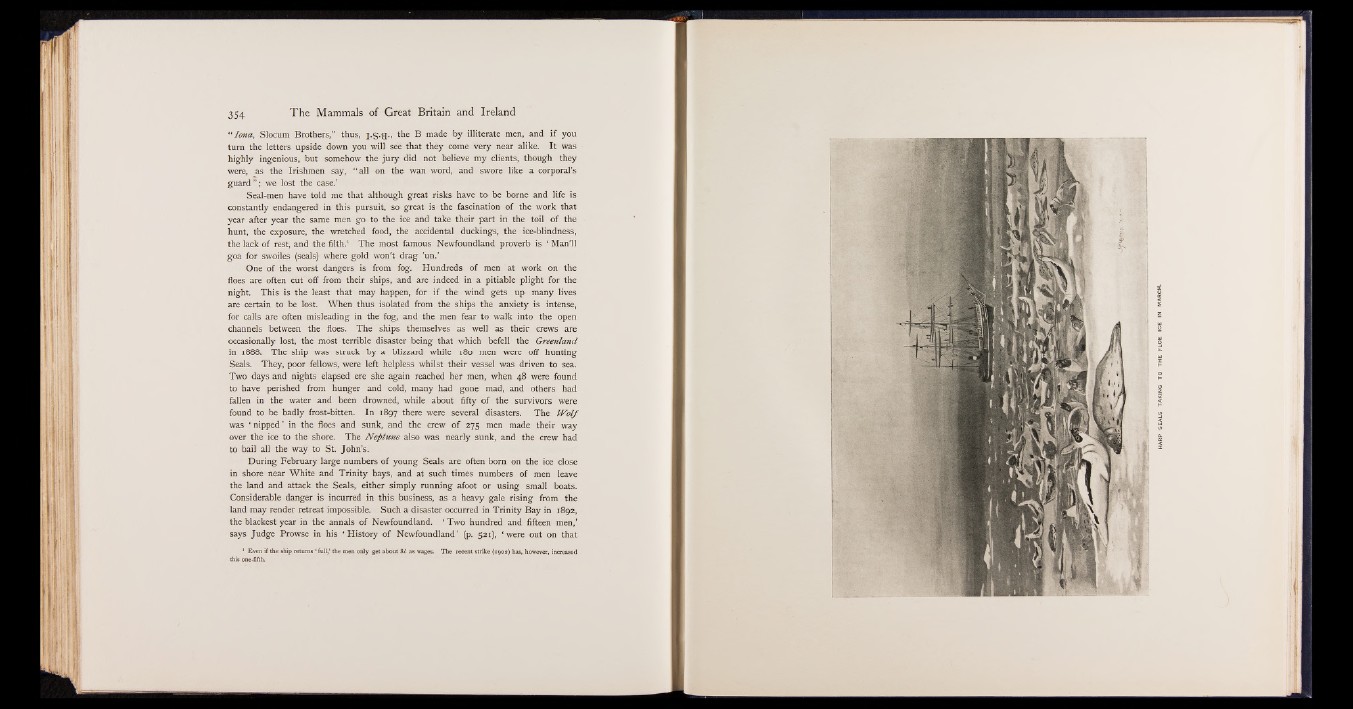
“ Iona, Slocum Brothers,” thus, i.g.g., the B made by illiterate men, and if you
turn the letters upside down you will see that they come very near alike. It was
highly ingenious, but somehow the jury did not believe my clients, though they
were, as the Irishmen say, “ all on the wan word, and swore like a corporal’s
guard” ; we lost the case.’
Seal-men have told me that although great risks have to be borne and life is
constantly endangered in this pursuit,. so great is the fascination of the work that
year after year the same men go to the ice and take their part in the toil of the
hunt, the exposure, the wretched food, the accidental duckings, the ice-blindness,
the lack of rest, and the filth.1 The most famous Newfoundland proverb is ‘ Man’ll
goa for swoiles (seals) where gold won’t drag ’un.’
One of the worst dangers is from fog. Hundreds of men at work on the
floes are often cut off from their ships, and are indeed in a pitiable plight for the
night. This is the least that may happen, for if the wind gets up many lives
are certain to be lost. When thus isolated from the ships the anxiety is intense,
for calls are often misleading in the fog, and the men fear to walk into the open
channels between the floes. The ships themselves as well as their crews are
occasionally lost, the most terrible disaster being that which befell the Greenland
in 1888. The ship was struck by a blizzard while 180 men were off hunting
Seals. They, poor fellows, were left helpless whilst their vessel was driven to sea.
Two days and nights elapsed ere she again reached her men, when 48 were found
to have perished from hunger and cold, many had gone mad, and others had
fallen in the water and been drowned, while about fifty of the survivors were
found to be badly frost-bitten. In 1897 there were several disasters. The W olf
was * nipped ’ in the floes and sunk, and the crew of 275 men made their way
over the ice to the shore. The Neptune also was nearly sunk, and the crew had
to bail all the way to St. John’s.
During February large numbers of young Seals are often born on the ice close
in shore near White and Trinity bays, and at such times numbers of men leave
the land and attack the Seals, either simply running afoot or using small boats.
Considerable danger is incurred in this business, as a heavy gale rising from the
land may render retreat impossible. Such a disaster occurred in Trinity Bay in 1892,
the blackest year in the annals of Newfoundland. ‘ Two hundred and fifteen men,’
says Judge Prowse in his ‘ History of Newfoundland’ (p. 521), ‘ were out on that
1 Even if the ship returns ‘ full,’ the men only get about 8/. as wages. The recent strike (1902) has, however, increased
this one-fifth.